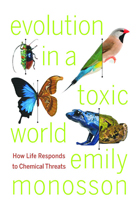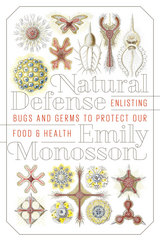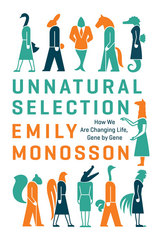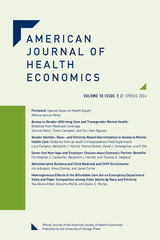3 books by Monosson, Emily

Evolution in a Toxic World
How Life Responds to Chemical Threats
Emily Monosson
Island Press, 2012
With BPA in baby bottles, mercury in fish, and lead in computer monitors, the world has become a toxic place. But as Emily Monosson demonstrates in her groundbreaking new book, it has always been toxic. When oxygen first developed in Earth's atmosphere, it threatened the very existence of life: now we literally can't live without it. According to Monosson, examining how life adapted to such early threats can teach us a great deal about today's (and tomorrow's) most dangerous contaminants. While the study of evolution has advanced many other sciences, from conservation biology to medicine, the field of toxicology has yet to embrace this critical approach.
In Evolution in a Toxic World, Monosson seeks to change that. She traces the development of life's defense systems—the mechanisms that transform, excrete, and stow away potentially harmful chemicals—from more than three billion years ago to today. Beginning with our earliest ancestors' response to ultraviolet radiation, Monosson explores the evolution of chemical defenses such as antioxidants, metal binding proteins, detoxification, and cell death.
As we alter the world's chemistry, these defenses often become overwhelmed faster than our bodies can adapt. But studying how our complex internal defense network currently operates, and how it came to be that way, may allow us to predict how it will react to novel and existing chemicals. This understanding could lead to not only better management and preventative measures, but possibly treatment of current diseases. Development of that knowledge starts with this pioneering book.
In Evolution in a Toxic World, Monosson seeks to change that. She traces the development of life's defense systems—the mechanisms that transform, excrete, and stow away potentially harmful chemicals—from more than three billion years ago to today. Beginning with our earliest ancestors' response to ultraviolet radiation, Monosson explores the evolution of chemical defenses such as antioxidants, metal binding proteins, detoxification, and cell death.
As we alter the world's chemistry, these defenses often become overwhelmed faster than our bodies can adapt. But studying how our complex internal defense network currently operates, and how it came to be that way, may allow us to predict how it will react to novel and existing chemicals. This understanding could lead to not only better management and preventative measures, but possibly treatment of current diseases. Development of that knowledge starts with this pioneering book.
[more]

Natural Defense
Enlisting Bugs and Germs to Protect Our Food and Health
Emily Monosson
Island Press, 2017
For more than a century, we have relied on chemical cures to keep our bodies free from disease and our farms free from bugs and weeds. We rarely consider human and agricultural health together, but both are based on the same ecology, and both are being threatened by organisms that have evolved to resist our antibiotics and pesticides. Patients suffer from C.diff, a painful, potentially lethal gut infection associated with multiple rounds of antibiotics; orange groves rot from insect-borne bacteria; and the blight responsible for the Irish potato famine outmaneuvers fungicides. Our chemicals are failing us.
Fortunately, scientists are finding new solutions that work with, rather than against, nature. Emily Monosson explores science’s most innovative strategies, from high-tech gene editing to the ancient practice of fecal transplants. There are viruses that infect and bust apart bacteria; vaccines engineered to better provoke our natural defenses; and insect pheromones that throw crop-destroying moths into a misguided sexual frenzy. Some technologies will ultimately fizzle; others may hold the key to abundant food and unprecedented health. Each represents a growing understanding of how to employ ecology for our own protection.
Monosson gives readers a peek into the fascinating and hopeful world of natural defenses. Her book is full of optimism, not simply for particular cures, but for a sustainable approach to human welfare that will benefit generations to come.
Fortunately, scientists are finding new solutions that work with, rather than against, nature. Emily Monosson explores science’s most innovative strategies, from high-tech gene editing to the ancient practice of fecal transplants. There are viruses that infect and bust apart bacteria; vaccines engineered to better provoke our natural defenses; and insect pheromones that throw crop-destroying moths into a misguided sexual frenzy. Some technologies will ultimately fizzle; others may hold the key to abundant food and unprecedented health. Each represents a growing understanding of how to employ ecology for our own protection.
Monosson gives readers a peek into the fascinating and hopeful world of natural defenses. Her book is full of optimism, not simply for particular cures, but for a sustainable approach to human welfare that will benefit generations to come.
[more]

Unnatural Selection
How We Are Changing Life, Gene by Gene
Emily Monosson
Island Press, 2015
Gonorrhea. Bed bugs. Weeds. Salamanders. People. All are evolving, some surprisingly rapidly, in response to our chemical age. In Unnatural Selection, Emily Monosson shows how our drugs, pesticides, and pollution are exerting intense selection pressure on all manner of species. And we humans might not like the result.
Monosson reveals that the very code of life is more fluid than once imagined. When our powerful chemicals put the pressure on to evolve or die, beneficial traits can sweep rapidly through a population. Species with explosive population growth—the bugs, bacteria, and weeds—tend to thrive, while bigger, slower-to-reproduce creatures, like ourselves, are more likely to succumb.
Monosson explores contemporary evolution in all its guises. She examines the species that we are actively trying to beat back, from agricultural pests to life-threatening bacteria, and those that are collateral damage—creatures struggling to adapt to a polluted world. Monosson also presents cutting-edge science on gene expression, showing how environmental stressors are leaving their mark on plants, animals, and possibly humans for generations to come.
Unnatural Selection is eye-opening and more than a little disquieting. But it also suggests how we might lessen our impact: manage pests without creating super bugs; protect individuals from disease without inviting epidemics; and benefit from technology without threatening the health of our children.
Monosson reveals that the very code of life is more fluid than once imagined. When our powerful chemicals put the pressure on to evolve or die, beneficial traits can sweep rapidly through a population. Species with explosive population growth—the bugs, bacteria, and weeds—tend to thrive, while bigger, slower-to-reproduce creatures, like ourselves, are more likely to succumb.
Monosson explores contemporary evolution in all its guises. She examines the species that we are actively trying to beat back, from agricultural pests to life-threatening bacteria, and those that are collateral damage—creatures struggling to adapt to a polluted world. Monosson also presents cutting-edge science on gene expression, showing how environmental stressors are leaving their mark on plants, animals, and possibly humans for generations to come.
Unnatural Selection is eye-opening and more than a little disquieting. But it also suggests how we might lessen our impact: manage pests without creating super bugs; protect individuals from disease without inviting epidemics; and benefit from technology without threatening the health of our children.
[more]
READERS
Browse our collection.
PUBLISHERS
See BiblioVault's publisher services.
STUDENT SERVICES
Files for college accessibility offices.
UChicago Accessibility Resources
home | accessibility | search | about | contact us
BiblioVault ® 2001 - 2024
The University of Chicago Press









